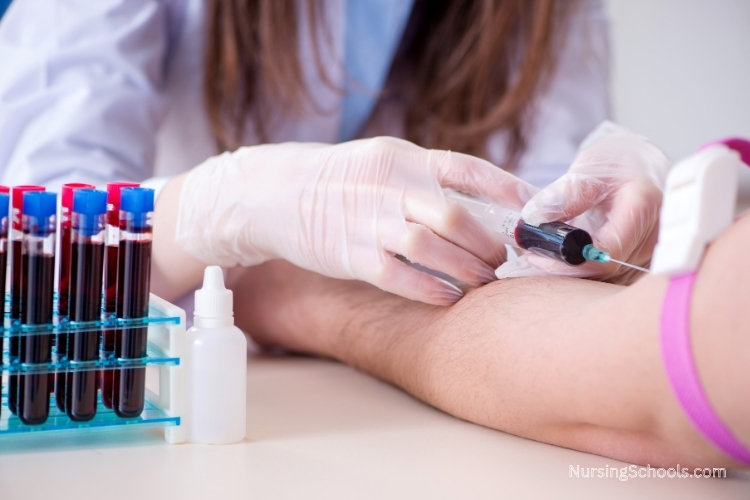Hematology Nurse
Healthcare Career Guide

Overview
What is a Hematology Nurse?
A Hematology Nurse specializes in the care and treatment of patients with blood disorders, including anemia, leukemia, lymphoma, hemophilia, and sickle cell disease. These nurses work alongside hematologists, oncologists, and other healthcare professionals to diagnose, manage, and treat conditions affecting the blood and bone marrow.
Hematology Nurses provide direct patient care, assist with blood transfusions, administer chemotherapy, and educate patients on managing chronic blood disorders. They work in hospitals, oncology clinics, transfusion centers, and specialized hematology units to support patients throughout diagnosis, treatment, and recovery.
This career requires advanced clinical skills, an understanding of hematologic diseases, and the ability to provide both technical and emotional support to patients undergoing intensive treatments.
Education
How Do I Become a Hematology Nurse?
Becoming a Hematology Nurse requires education, clinical experience, certification, and specialized training in hematologic care. Follow these steps to enter this challenging and rewarding healthcare career:
- Earn a Nursing Degree. Complete an Associate Degree in Nursing (ADN) or Bachelor of Science in Nursing (BSN). A BSN is preferred for specialized roles in hematology nursing.
- Pass the NCLEX-RN. Obtain your nursing license by passing the National Council Licensure Examination for Registered Nurses (NCLEX-RN).
- Gain Clinical Experience. Work as a Registered Nurse (RN) in medical-surgical units, oncology, or transfusion centers to develop expertise in hematology-related conditions.
- Obtain Hematology Nursing Certification. Pursue certification through the Oncology Nursing Certification Corporation (ONCC) or the Hematology/Oncology Nurses Association (HOPA) to demonstrate expertise in hematologic care.
- Continue Professional Development. Stay updated with advances in hematology nursing through continuing education courses, professional organizations, and specialized training programs.
On average, it takes 4-6 years to become a Hematology Nurse, including nursing school, licensure, and gaining relevant experience. Certification enhances credibility and career advancement opportunities in this field.

Average Salary
How Much Does a Hematology Nurse Make?
Salaries for Hematology Nurses vary depending on location, experience, and certifications. On average, a Hematology Nurse can expect to earn between $75,000 and $100,000 annually.
Average annual salary for a Hematology Nurse:
- Entry-level: $75,000 - $85,000 per year.
- Mid-career: $85,000 - $95,000 per year.
- Experienced: $95,000 - $100,000 per year.
The U.S. Department of Labor reports that Hematology Nurses earn an average hourly wage of approximately $39.00 per hour. Assuming a 40-hour workweek, this equates to an annual salary of $81,120. The lowest 10% earn less than $33.00 per hour, while the highest 10% earn more than $47.00 per hour, resulting in an annual salary range of $68,640 to $97,760 per year.
Job Duties
What Does a Hematology Nurse Do?
Hematology Nurses provide specialized care to patients with blood disorders, assist in complex treatments, and educate patients about managing their conditions. Their role is essential in supporting both acute and chronic hematologic care.
The most common job duties of a Hematology Nurse:
- Administering Chemotherapy and Medications. Provide chemotherapy, targeted therapy, and other medications used to treat blood disorders and cancers.
- Managing Blood Transfusions. Monitor patients receiving blood transfusions and ensure compatibility and safety procedures are followed.
- Assessing Patient Symptoms. Identify and manage complications related to anemia, clotting disorders, or bleeding conditions.
- Educating Patients and Families. Provide guidance on managing chronic blood disorders, treatment side effects, and lifestyle adjustments.
- Collaborating with Hematologists and Oncologists. Work closely with specialists to develop and adjust treatment plans for patients with complex hematologic conditions.
- Performing Diagnostic Tests. Assist in bone marrow biopsies, blood tests, and genetic screenings for blood disorders.
- Providing Palliative and End-of-Life Care. Support patients with terminal blood cancers and ensure comfort and symptom management.
- Advanced Duties. Experienced Hematology Nurses may work in research, clinical trials, or leadership roles within hematology departments.
Hematology Nurses primarily work in hospitals, cancer treatment centers, research facilities, and transfusion clinics. Their role requires a strong knowledge of hematologic conditions, patient-centered care, and the ability to work in high-acuity medical settings.

Essential Skills
What Skills Does a Hematology Nurse Need?
Hematology Nurses need a combination of technical skills, patient education abilities, and emotional resilience to provide effective care for patients with blood disorders. These skills ensure they can manage treatments, provide emotional support, and collaborate effectively with healthcare teams.
Here are some of the skills a Hematology Nurse needs to succeed:
- Clinical Proficiency. Administer complex medications, manage transfusions, and perform hematology-related procedures.
- Patient Education. Clearly explain blood disorders, treatment plans, and self-care strategies to patients and their families.
- Critical Thinking. Assess patient conditions and quickly identify complications such as clotting issues or adverse drug reactions.
- Communication. Provide compassionate care and explain complex medical information in an understandable manner.
- Attention to Detail. Monitor lab results, medication dosages, and transfusion reactions with precision.
- Emotional Resilience. Cope with the challenges of caring for patients with chronic or terminal blood conditions.
- Teamwork. Collaborate with hematologists, oncologists, and laboratory professionals to ensure comprehensive patient care.
- Research and Continuing Education. Stay updated on advancements in hematology treatments and participate in ongoing education.
One of the biggest challenges of being a Hematology Nurse is managing the emotional toll of treating patients with life-threatening blood disorders. However, the role is highly rewarding, as these nurses play a crucial part in improving patient outcomes and quality of life.
Last updated: February 24, 2025
References:
- Registered Nurses. Bureau of Labor Statistics, U.S. Department of Labor. Occupational Outlook Handbook. Retrieved February 24, 2025.
- Hematology Nurse. Johnson & Johnson, Nursing Careers. Retrieved February 24, 2025.
- The Evolving Role of Haematology Nursing Practice: A Cross-Sectional Survey. National Library of Medicine, PubMed Central. Retrieved February 24, 2025.
- Hematology Nurse Salary. ZipRecruiter, Career Profile. Retrieved February 24, 2025.
- What to know about hematology. Medical News Today. Retrieved February 24, 2025.
- CPHON and BMTCN Certification. Association of Pediatric Hematology/Oncology Nurses. Retrieved February 24, 2025.


